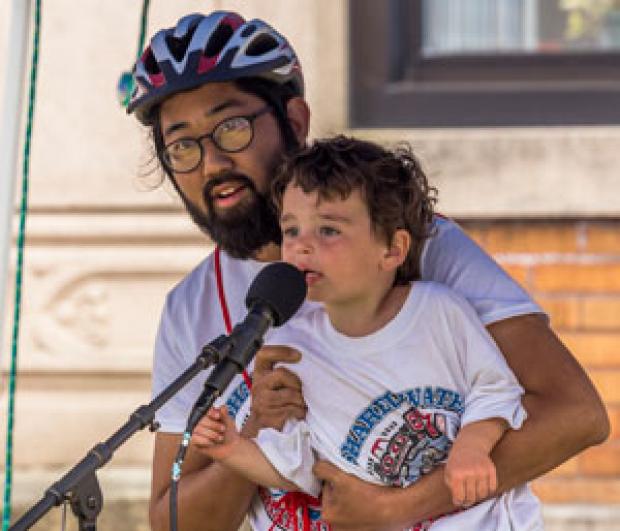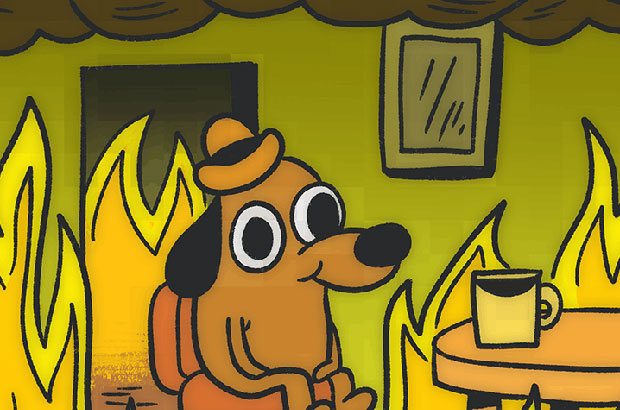On the second night of our family vacation at Breitenbush Hot Springs in Central Oregon, I awaken suddenly to my three-year-old son coughing. A breeze is blowing gently over our tent, a welcome relief after an oppressively hot day. But when I turn to see Trevor’s little body seizing up with an intensifying cough, and he struggles to breathe, panic grips me -- along with the realization that the breeze is the source of the problem, which is carrying smoke from the Whitewater Fire that’s been burning just ten miles away.
For years I have prided myself for working to solve the climate crisis. I never thought of myself as a climate denier. But it’s in moments like this that I’ve been forced to see how denial has played out, subtly or not so-subtly, in my own thinking: how I recoiled after Hurricane Katrina in 2005; how I couldn’t fully stomach or take seriously the 2009 email campaigns warning that the federal climate bill was our last best chance to solve global warming; how I brushed aside the global heat records in 2014, and again in 2015, and finally had to take them more seriously in 2016.
Even as I work to highlight the urgency of the climate crisis among my colleagues and friends, I see the moments where I distanced myself emotionally to avoid having to confront my worst fears. Perhaps I equivocated. Perhaps I avoided bringing up global warming in polite company, because there was a part of me which knew that if we only let ourselves see how bad it really is, we would all come undone.

In the first two days since arriving at Breitenbush, I have been watching my son’s health deteriorate. I also have been experiencing headaches, chest aches, and coughing. Trevor’s boundless childhood energy may be dampened, but I admire how he does his best to continue to play and make the best of the situation. In the days before our trip I’ve concerned myself with the 100+ degree cauldron that Central Oregon has become in summertime. The wildfires in British Columbia already enshrouded our Whidbey Island home with smoke, and I wrongly thought our vacation would be a respite.
Both literally and metaphorically, it’s becoming increasingly difficult to escape the fires. As I lay awake restless on this dark-despite-moonlit-night, there is fire, fire everywhere—15 large, uncontained fires burning throughout the Northwest.
The Fire near Breitenbush Hotsprings
Situated on 154 acres of wildlife sanctuary, Breitenbush is a special place on earth to us. Our friends Hannah and Phil have been making annual visits there for years, and we were honored to be invited to join them. I appreciate this retreat center and worker-owned cooperative as an exemplar of the kind of low-impact, environmentally responsible communities we need more of in this time of escalating planetary stress.
Breitenbush provides a place for personal renewal and healing, and does so off-the-grid with geothermal heat, micro-hydro power, and its own freshwater and wastewater management systems. The threat to such a place by a late-July lightning fire seems unthinkable and has brought undeniable tension to a normally retiring and contemplative atmosphere.
Firefighters come and go from the main office delivering news. Guests sit on the front deck of the lodge wearing surgical masks. Each day helicopters patrol the hills surrounding Breitenbush while the ever-present smoke thickens and then clears in an seemingly endless cycle. For the time being, the area is considered safe unless the fire threatens to overtake nearby Devil’s Ridge.
But our day hike is off: To protect Breitenbush, the surrounding community, and the nearby town of Detroit, over 600 personnel, vehicles and heavy equipment have been called in to clear a wide buffer and prepare to make a stand along the road between the fire and the resort. To protect public and firefighters’ safety, the Willamette and Deschutes National Forests have closed all trail access points into Jefferson Park inside the Mt. Jefferson Wilderness, including a 28-mile stretch of the Pacific Crest Trail.
If your house is on fire, what should you do?
Fires like this, along with extreme heat, flooding, and hurricanes, are all examples of problems affected by nonstationarity, the practice of using past trends in natural systems to help predict future trends. It affects everything from the basis of our culture, our economy, and our systems of governance. But the climate crisis is directly at odds with this idea because as the climate shifts, the trends are anything but predictable.
Nonstationarity is often used in predicting floods and large water events, but as we’ve seen with Hurricane Harvey in Texas and two additional 500-year flooding events in Houston in the last 18 months, the past is not a reliable indicator of the future. The media portrays each human-caused climate disaster as a one-off, something horrible after which, once it has passed, we will again to return to life as normal.
What we’re refusing to acknowledge is that “normal” is itself a thing of the past. Fires of this size, scope and frequency are not normal. 170,000 children in Oregon and Washington have asthma. Air quality is such a widespread problem that the World Health Organization says that for every breath we take (12-18 breaths per minute), someone in the world dies. Death on this scale is not normal.
To challenge our tendency to compartmentalize and therefore not respond to climate-fueled disasters, Oregon-based writer and philosopher Kathleen Dean Moore presents us with a thought experiment. If your house is on fire, what should you do? Maybe we stare into the flames and say, “This isn’t happening.” Worse, we might debate whether it was caused by a human, an arsonist, or by nature. We might study the natural temperature variations of the house throughout the years we have lived there. We might even write grants to study how quickly the fire is advancing and then appoint a commission to examine how to adapt to life in the burnt-out rubble of a house that was once inexpressibly beautiful.
These responses aren’t sane when applied to the concrete example of a house on fire, but they have been the response to the climate crisis. For the third summer in a row, we are watching our house—our planetary home—burn.
In the past, I blindly hoped that someone or something “out there” will save us. Those years of denial have only brought me to the painful recognition that existing institutions are not equipped or able to make the changes needed to turn back the horrors we’re witnessing with ever-increasing frequency. We cannot cope with the ravages of global climate change without mobilizing a social movement of unprecedented power. Yet denial and separation prevent us from getting and staying involved, connected, informed, and active.
We need people with diverse skill and knowledge sets working together in a spirit of community to co-create new, equitable and just living economies that serve people and restore our shared planet to a state of health.
But inside our Breitenbush tent, those solutions feel far. As Trevor’s coughing settles down and he finally falls asleep, I lie awake. I worry about the future. At this moment I don’t know that in a couple of weeks, dozens of new wildfires will start, scorching the Columbia Gorge, others blanketing eastern Oregon and Washington in smoke. I don’t know that in the coming months, hurricane after devastating hurricane will make landfall in Texas, Florida, Mexico, Puerto Rico.
I have no way of knowing that the Whitewater Fire will continue to burn in the area for a whole month after we leave, gradually eating away much of the forest on the west side of Mount Jefferson and making its way toward Breitenbush. Eventually the embers will leap onto Devil’s Peak, a mere two miles from where we’re camping, and finally in early September, firefighters will have no choice but to order the evacuation of everyone in this community.
I don’t what the future holds. I know only one thing: it’s my son’s house that is burning down, and I must do something to stop it.

